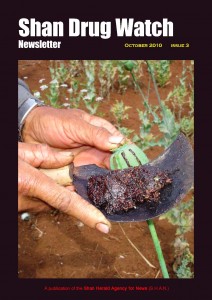Shan Drug Watch Issue 3
By Shan Herald Agency for News • September 23, 2010 For the second consecutive year, opium output is down in Burma, particularly in its biggest state, Shan. Seizures of drugs have also been more frequently reported during the past year.
For the second consecutive year, opium output is down in Burma, particularly in its biggest state, Shan. Seizures of drugs have also been more frequently reported during the past year.
It might thus appear that Burma’s ruling junta really means business against drugs. Indeed, during the past year most international media reports have highlighted the ethnic armies as the root cause of Burma’s drug problem, particularly those that are refusing to become junta-run militias unless their calls for self rule are answered. “Rebels manufacturing massive quantities of drugs to sell for missiles and guns as they plan fight against junta” was the sub-heading of a recent British news article.
However, the findings in this newsletter tell a different story. During the past opium growing season (2009-2010) researchers from the Shan Herald Agency for News travelled to every township in Shan State, interviewing farmers, traders and officials about poppy cultivation and production and trade of opium and other illicit drugs.
Poppy cultivation is continuing unchecked in 46 of the 55 Shan townships, mostly in areas under the control of the Burma Army and its militias. However, adverse weather conditions caused a massive drop in opium output during the last season. In other words, there is no evidence of sustained effort by the Burmese regime to eradicate opium. On the contrary, opium farmers throughout the state are being taxed by Burma Army units.
Download the full report here.
Tags: Drugs, Opium, Shan, Shan Herald Agency for NewsThis post is in: Drugs
Related PostsStatement of the 4th Myanmar Opium Farmers’ Forum
ကခ်င္ျပည္နယ္အရပ္ဖက္လူ႕အဖြဲ႕အစည္းျငိမ္းခ်မ္းေရးကြန္ယက္၏သေဘာထားထုတ္ျပန္ခ်က္
Statement of CSO Forum on recent deathly attacked to un-armed Community Led Anti-Drugs Campaign while eradicating opium fields
NLD’s Trip into the Murky World of the Drugs Trade
တစ္ေက်ာ့ျပန္ – မူလအေျခအေနဆိုးသို႔ ျပန္လည္ဆိုက္ေရာက္လာသည့္ ေရႊႀတိဂံေဒသ









 All posts
All posts